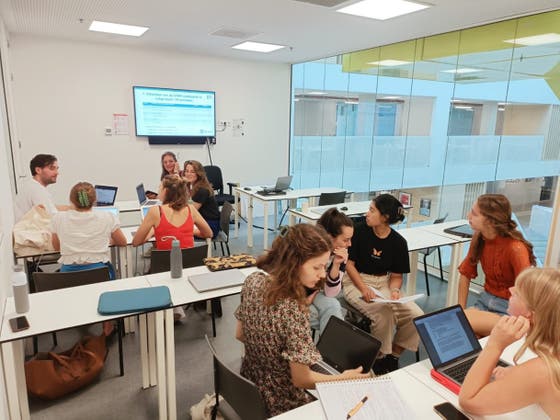Learning to collaborate with other healthcare professionals: a perspective from the basic curriculum

Judith, would you like to be the first to tell us something about your interprofessional lessons? Because you give it to the bachelor students, right?
Yes, I supervise a group of second-year nursing and medical students who are taking an elective course on lifestyle 10 times. For example, they make a presentation together about which lifestyle care providers are needed for a (paper) patient, using, among other things, a completed spider web from Positive Health.
That sounds very topical. And what other lessons do you teach?
Frédérique: Judith and I both teach fifth-year medical students who, together with fourth-year HBO-V students, take two lessons in which they, among other things, hold moral consultations with each other. They receive different information, each from their field, and then have to discuss together a derailed psychiatric patient.
What do you notice?
Frédérique: Medical students have no idea how the different nursing courses work and that the responsibilities differ accordingly, even though they have been doing an internship for a long time. And future nurses, for example, are not aware of the differences between AIOS and ANIOS.
Do you have the feeling that they understand the importance of good cooperation?
Frédérique: Yes, for example when dealing with the polypharmacy case, they notice how different their expertise is and how much they need each other.
Judith: we asked the second-year medical students to reflect on the collaboration with the other profession, but they turned out to be barely able to do so. It's still far too early. The medical students have not yet been on the work floor and therefore do not yet know what they will have to do and how they distinguish themselves from others. I think interprofessional education (IPO) is more applicable to seniors who already have some professional identity.
How important do you think the IPO is then?
Frederique: Many patients are complex and therefore receive care from different professions, each with their perspective. You have to learn to collect those perspectives and merge them into something even better. But then you do have to see the value of those other perspectives. I strongly believe that having this knowledge will cause people to use it, and believe that education is really important
Judith: but then you shouldn't start too early! And I also think that you especially have to work on it in daily practice. Of course, one must first practice in teaching situations, where there is peace for reflection, but then continue it in the hectic and relative messiness of daily work in healthcare.
Frédérique: yes, I am also very much in favor of the training creating moments during all internships to reflect on interprofessional collaboration with the many different healthcare workers.
So you are IPO advocates?
In unison: yes!
Saskia Mol
